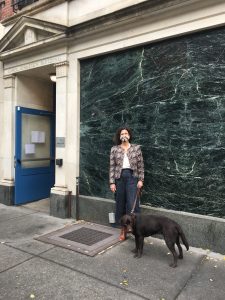
Executive Director Kopel with Therapy Dog Gali outside of 241 West 72nd Street
By Claudie Benjamin
The National Council of Jewish Women New York (NCJW NY) was founded in 1894. In the mid-1970s, the organization moved to what is now known as “Council House” at 241 West 72nd Street.
A main activity at the building today is Council Lifetime Learning. “Our mission as an organization has always been tremendously broad. Our senior programming known as Council Lifetime Learning, was always one program among many,” explains Executive Director Andrea Salwen Kopel. All programs are and have always been both consistent with Jewish values and are non-sectarian. Describing the Council Lifetime Learning program as “strength-based”, Director Kopel explains, “We want to build on what’s right rather than fixing what’s wrong”.
In the early 1980s, initiatives addressing food insecurity joined Council Lifetime Learning for seniors and other programs in the building.
Food distribution is provided in two ways:
Monday Food Pantry: Pre-Covid typically involved providing groceries from which clients choose to take home to prepare. During the worst of the pandemic, volunteers bagged groceries as a health precaution. Those who join the line for the Food Pantry on Mondays usually have a home with cooking facilities. This provides heads of households and others with a range of supplies (about $65 worth) that helps them prepare nutritious foods for themselves and their families.
Covid precautions limited the numbers of people who could come in to make their own selection from the pantry shelves. During the worst of Covid, bags were distributed at the front door, filled with supplies chosen and bagged by volunteers.
But, now Director Kopel explains, “We’ve gone back to our previous model which allows people to come in, make selections according to preference. This is more respectful of dignity, avoids allergy issues and minimizes waste.”
Wednesday and Sunday Community Kitchen:
Providing healthy, fresh food for those in need drew more food recipients than ever during the worst of the Covid months. Lines continue to form on Mondays and Wednesdays outside the NCJW NY building. “No one goes away hungry,” says Director say Kopel. “We’ve never turned anyone away.”
The people who come to the building for the prepared food distribution on Wednesdays and Sundays are generally individuals without stable housing and without access to cooking facilities. Providing more detail, Director Kopel says, “Wednesdays and Sundays is the Community Kitchen, with about 50 people per distribution, currently bagged sandwich meals but in normal times a hot, freshly prepared sit-down meal is served at tables. We hope to go back to that when it’s safe to dine indoors together.”
NCJW NY receives a large volume of donated food from partners Food Bank for NYC, and City Harvest. The grant from the government NourishNY program runs out this month. NCJW NY is hopeful it will be renewed.
In addition, food is purchased at wholesale prices by NCJW NY using funds raised from the local community and from foundations.
Many volunteers are involved in the programming for seniors which focuses heavily on the arts. Courses are offered in stained glass making, painting, voice, music and theater. The fees for participating are low compared with those offered by other organizations. Director Kopel says “We are proud to have scholarships available for those who wish to participate but cannot afford the full fee.” She says her organization sees the programs as not only engaging participants in activities they enjoy but giving many who live alone a place to be involved in a positive way with neighbors with similar interests. It also provides oversight by professional social work staff.
One added feature at NCJW NY for New Year 2022 will be Director Kopel’s dog Gali, who has been certified as a therapy dog. She will begin visiting NCJW NY’s LINC program, for people with memory loss and dementia, offering affection and support as only a dog can do.
